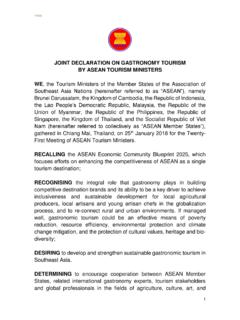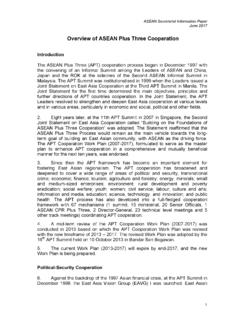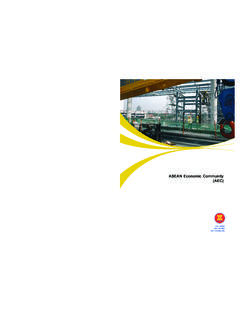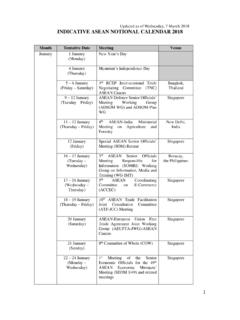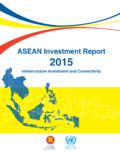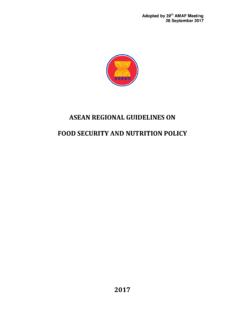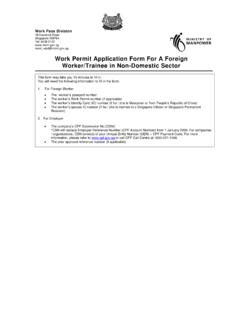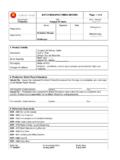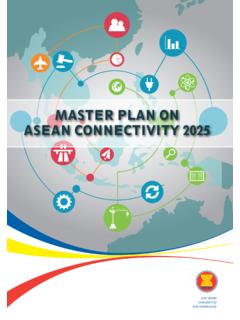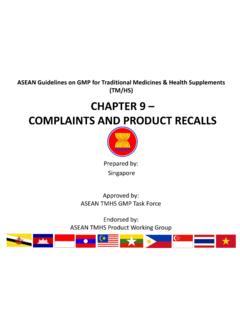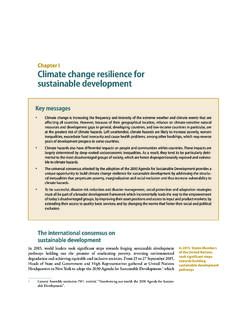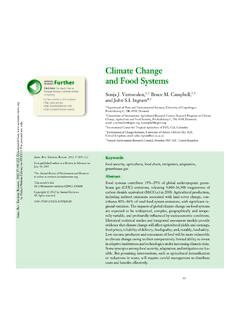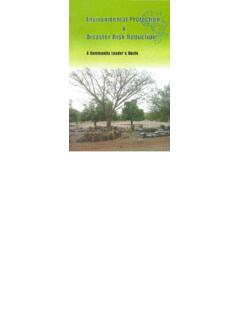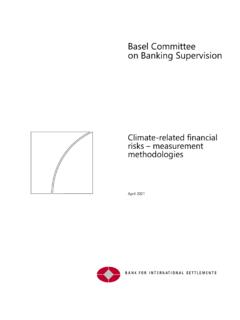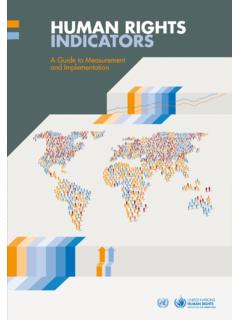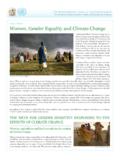Transcription of ASEAN State of Climate Change Report
1 ASEAN State of Climate Change Report Current status and outlook of the ASEAN region Toward the ASEAN Climate vision 2050. ASEAN . State of Climate Change Report Profile The Association of Southeast Asian Nations ( ASEAN ) was established on 8 August 1967. The Member States are Brunei Darussalam, Cambodia, Indonesia, Lao PDR, Malaysia, Myanmar, Philippines, Singapore, Thailand and Viet Nam. The ASEAN Secretariat is based in Jakarta, Indonesia. For inquiries, contact: The ASEAN Secretariat Community Relations Division (CRD). 70A Jalan Sisingamangaraja Jakarta 12110, Indonesia Phone: (62 21) 724-3372, 726-2991. Fax: (62 21) 739-8234, 724-3504. E-mail: Catalogue-in-Publication Data ASEAN State of Climate Change Report (ASCCR). Jakarta, ASEAN Secretariat, October 2021. 1. ASEAN Environment Climate Change 2.
2 Policy Adaptation Mitigation ASEAN : A Community of Opportunities for All The text of this publication may be freely quoted or reprinted, provided proper acknowledgement is given and a copy containing the reprinted material is sent to the Community Relations Division (CRD) of the ASEAN Secretariat, Jakarta. General information on ASEAN appears online at the ASEAN Website: Copyright Association of Southeast Asian Nations ( ASEAN ) rights reserved Supported by: Implemented by: 2108-11 Kamiyamaguchi, Hayama, Kanagawa, 240-0115 Japan +81 (46) 855 3700. RIDE MEDIA & DESIGN Inc. Designed by: Urban Resort Daikanyama 6F - 7F, 1-3-3 Nakameguro, Meguro-ku, Tokyo i ASEAN State of Climate Change Report ASEAN State of Climate Change Report ii Foreword The year 2021 marks a crucial milestone in our fight to combat Climate Change .
3 The Sixth Assessment Report of the Intergovernmental Panel on Climate Change (IPCC) provides us with undeniable evidence that Climate Change is real and is impacting our daily lives, especially the most vulnerable sectors of our society. As we move towards the 26th Session of the Conference of the Parties (COP26) of the United Nations Framework Convention on Climate Change (UNFCCC) this November, it is timely to reflect and strategise how we can further raise our commitments to contribute to the global and regional Climate agenda. The road towards carbon neutrality by 2050 is a daunting task and requires extensive planning and collaborative efforts within and outside ASEAN . Over the years, ASEAN has demonstrated commitment to addressing Climate Change , including through multi- sectoral dialogue and relevant activities involving key partners in various sectors, such as agriculture, forestry, energy, transport, disaster management, and finance.
4 The ASEAN Joint Statements on Climate Change to UNFCCC COPs attests to our region's aspirations and renewed commitments to contribute towards global Climate targets. Moreover, under the chairmanship of Brunei Darussalam in 2021, ASEAN has identified Climate Change as one of its regional priorities. These initiatives have enabled ASEAN to foster strong partnerships with regional and global partners to support building local capacities, initiate sustained Climate investments, and facilitate knowledge and technology exchanges. The ASEAN State of Climate Change Report (ASCCR) is the result of our endeavour conducted through close coordination with the Institute for Global Environmental Strategies (IGES) and with significant contribution from the Government of Japan. In essence, the Report provides an overview of the region's current status on Climate capacity, outlines how actions can be further improved, as well as identifies opportunities for cooperation and collaboration to support ASEAN 's efforts towards achieving the 2050 net zero transition targets.
5 Furthermore, the ASCCR hopes to improve mutual exchange of information and expertise, which would allow ASEAN Member States (AMS) to harmonise and align each other's efforts towards a Climate resilient region. Notably, the ASCCR also underscores the importance of raising capacities on Climate science in ASEAN . To support the speedy and just transition to net zero, there is a need to significantly boost AMS' access to Climate finance as well as knowledge and technology transfer on key priority areas, such as adaptation and mitigation measures, disaster risk reduction, and clean energy transition. Finally, the Report also touches on the value of pushing efforts to support the region's post-pandemic recovery under the ASEAN Comprehensive Recovery Framework. This reaffirms the region's iii ASEAN State of Climate Change Report strong commitment to alleviate the adverse impact of the COVID-19, and advance the implementation of regional and local priorities towards a more sustainable and resilient future.
6 I hope the valuable insights in this publication will generate renewed interest and productive dialogue among policymakers, the business sector, civil society, academia, local communities, and other key stakeholders in ASEAN to further promote collaborative actions as well as innovative solutions to combat Climate Change in the region. ASEAN State of Climate Change Report iv Preface The issue of Climate Change is a major concern to ASEAN , as Southeast Asia is one of the most at-risk regions in the world to the impacts on Climate Change . In response to the impacts of Climate Change , the ASEAN Member States (AMS) have proactively taken measures to address the issue at national, regional and global level, as reflected in AMS' national reports, ASEAN Community Vision 2025, and active participation in the United Nations Framework Convention on Climate Change (UNFCCC) and Paris Agreement.
7 Significant amount of data and information on the status of Climate Change issues in AMS, as well as AMS' efforts and initiatives to respond to them, have been produced. However, there is yet a coordinated effort at ASEAN level to collate, consolidate and synthesize them into a coherent Report to provide information on the State of, trends in, and prospects for Climate action in the region. Furthermore, AMS have agreed to explore the possibility of developing a harmonised approach to measuring, reporting and verifying greenhouse gas emissions as a first step towards further regional collaboration on, among others, carbon markets. The ASEAN State of Climate Change Report (ASCCR) aims to provide an overall outlook on the State of play of Climate Change in the context of ASEAN region, which could support AMS and ASEAN 's policy decision making process.
8 The Report is expected to support and contribute to the global stocktaking exercise that will take place every five years from 2023 onwards under the Paris Agreement, to assess collective progress towards achieving the purpose of the Agreement and its long-term goals. Specifically, the Report aims to: a) provide an overall outlook of the State of play of Climate Change issues, including the adaptation and mitigation efforts and cooperation taken at the national, regional and global level in the context of ASEAN , b) provide an analysis of the gaps, needs, challenges , lessons learned and best practices in addressing Climate Change in the region and among AMS, c) provide recommendations on key priorities / potential areas of cooperation for the development of regional strategy for Climate Change adaptation and mitigation in ASEAN to strengthen regional Climate action.
9 The Report is designed to inform and guide the region and AMS towards ambitious Climate Change targets, through a framework for transparency and transformative action to mitigate and adapt to Climate Change . The Report also constitutes an important step towards an ASEAN Climate action vision, which specifically includes priority actions by 2030 and key enabling environment up to 2050. The development of the ASCCR was initiated and coordinated by the ASEAN Secretariat, together with the Institute for Global Environmental Strategies (IGES), under the purview of the ASEAN Working Group on Climate Change (AWGCC). v ASEAN State of Climate Change Report and the ASEAN Senior Officials on Environment (ASOEN). It was made possible with immense support from the Government of Japan through Japan- ASEAN Integration Fund.
10 National think-tanks from each AMS were identified through rigorous process to gather data and information as well as develop national-level reports on the status of Climate Change in each AMS, while IGES as the implementing agency played a critical role in putting together the Report from regional perspective in close consultation and with valuable inputs from AWGCC, relevant ASEAN sectoral bodies, international organisations and dialogue / development partners. I wish to take this opportunity to acknowledge the contribution of each and every one of those who have been involved in the development of this Report . The ASCCR takes a co-production approach through in-country and regional consultation meetings and consultation, which will be elaborated further in Section 2. The approach brought together all stakeholders to (i) identify key gaps, lessons and good practices in terms of national Climate Change interventions for adaptation and mitigation, (ii) formulate a desirable methodology and framework; (iii) work on prioritised regional Climate actions based on key commonalities and differences among AMS; and (iv) identify capacity building opportunities and appropriate regional frameworks so that AMS and the ASEAN region can enhance transparency and move towards more ambitious adaptation and mitigation interventions.
